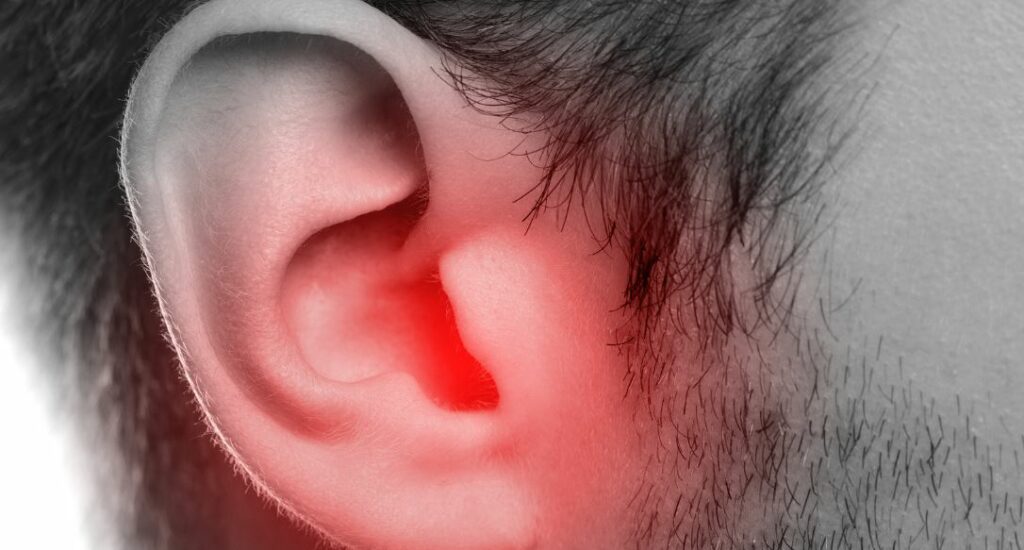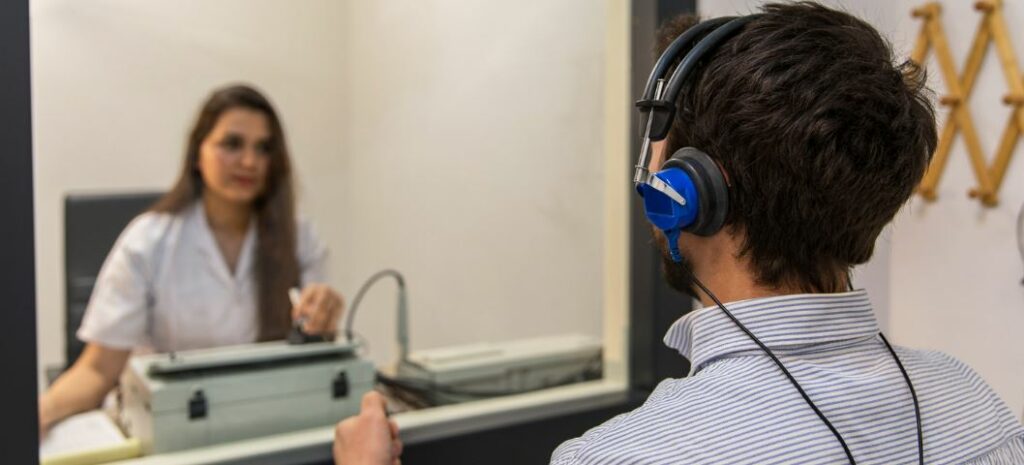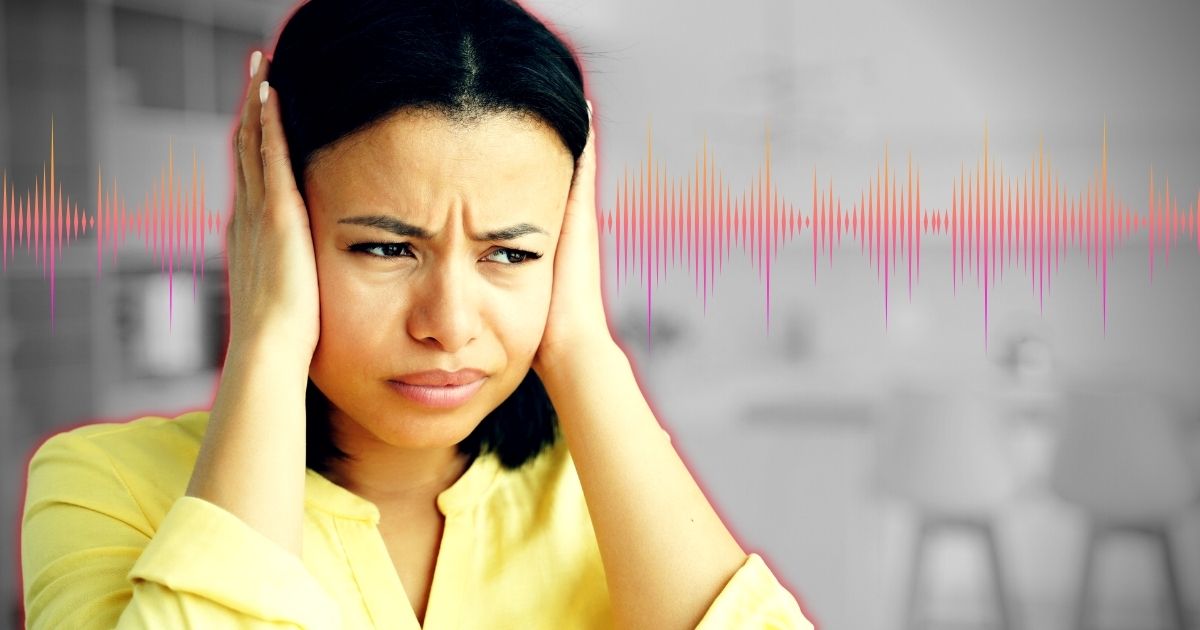Have you ever been in a situation where the noise around you was so loud that it became uncomfortable? Imagine if someone turned up the volume on the world around you, making even the most ordinary sounds unbearable. That is what hyperacusis can feel like.
Hyperacusis is defined as having an unusually heightened sensitivity to everyday sounds
What is Hyperacusis?
 Hyperacusis, much like hearing loss is an invisible condition, because it’s not something everyone knows about or that commonly occurs. It is often referred to as Decreased Sound Tolerance (DST). Here’s how it works: while people with regular hearing can comfortably handle a range of sounds, persons with hyperacusis experience them as if they’ve been turned up to the maximum limit. It is essentially a disorder in the perception of loudness.
Hyperacusis, much like hearing loss is an invisible condition, because it’s not something everyone knows about or that commonly occurs. It is often referred to as Decreased Sound Tolerance (DST). Here’s how it works: while people with regular hearing can comfortably handle a range of sounds, persons with hyperacusis experience them as if they’ve been turned up to the maximum limit. It is essentially a disorder in the perception of loudness.
People with hyperacusis often describe their experience as finding many noises excessively loud, painful, and sometimes even frightening. These sounds are not limited to music but even ordinary everyday sounds like a car engine, running water, or the hum of a refrigerator.
How Common is Hyperacusis?
Hyperacusis is considered rare, occurring in about 1 in 50,000 people. However, it is not just an issue for adults. It can affect children and adolescents, too, with estimates ranging anywhere from 3.2% to 17.1%. The wide range here depends on age and hearing status.
In adults, it has been reported in about 8% to 15.2% of cases.
What are the Different Types?
Hyperacusis is not a one-size-fits-all condition. It has different forms or types. The most common one is called “Loudness Hyperacusis,” where moderately intense sounds are perceived as uncomfortably loud. But there are other forms, too:
- Annoyance Hyperacusis: This is when the main issue is the negative emotional reaction to sound, leading to irritability and anxiety.
- Fear Hyperacusis: In this type, people with hyperacusis start avoiding situations with loud sounds because it scares them.
- Pain Hyperacusis (Noxacusis): This is the most severe form. It is relatively new in the field, and it can make even silence painful.

What Science Tells Us
Researchers are still investigating into what causes hyperacusis, but they have made some interesting discoveries. There are special nerve fibers in the inner ear called Type II fibers that act like pain fibers. When they get triggered by noise, it can feel like pain.
In addition, certain cells in your ear can release chemicals that activate these pain fibers. Noise can also interfere with the tiny bones and muscles in your ear or even your eardrum.
Hyperacusis vs. Phonophobia and Misophonia
The concepts of Phonophobia and misophonia present similarly and the terms are often used synonymously, however, an important distinction must be made between these conditions.
Hyperacusis is sound sensitivity arising from within the auditory system, and therefore can be triggered by any generic, low-intensity sound.1
In contrast, phonophobia and misophonia are disorders associated with the limbic system (related to emotion), and there is actually no abnormality in the auditory system.
Phonophobia is a psychiatric disease in which there is a fear of a specific sound, while misophonia is a psychological disease in which a specific sound triggers emotional and physical reactions.1
Although there is a distinction between the different conditions, it is possible for hyperacusis to develop into misophonia, as a result of the association of a negative experience paired with the discomfort of particular sounds.
Causes and Associations
Although there are many associations, a direct underlying cause for hyperacusis is rarely found. Some of the associations include:
- The most common cause of hyperacusis is high noise exposure. The association between hyperacusis and hearing loss is complicated. Occupational and recreational noise exposure and noise-induced hearing loss are commonly cited as major risk factors.
- Sudden Loud Noise: Some persons have developed hyperacusis after exposure to an excessively loud noise, like a gunshot or fireworks.
- Other Conditions associated with hyperacusis include Anxiety, Autism, Bell’s palsy, Depression, Down syndrome, Ear infections (otitis media), Meniere’s disease, Migraines, Post-traumatic stress disorder (PTSD), Superior Canal Dehiscence Syndrome (SCDS), Temporomandibular joint syndrome (TMJ).
- Some people develop hyperacusis symptoms following surgery or as a reaction to a medication.
How Hyperacusis Affects Your Life
Living with hyperacusis is not just about dealing with loud sounds. It can have a functional impact on your daily life. Everyday activities that most of us take for granted, like driving a car, mowing the lawn, or watching TV, can become challenging. Even going out to eat at a restaurant or catching a movie can be a burden because these places often feel too loud.
Hyperacusis is a complicated condition because everyone experiences it differently. There are no standardized tests to measure it, which makes it even more challenging to understand and manage.
Hyperacusis Among Veterans
In a 2023 study, researchers found that veterans who were already diagnosed with conditions like tinnitus, post-traumatic stress disorder (PTSD), headaches, or traumatic brain injuries were more likely to also have hyperacusis.
This suggests that hyperacusis often occurs alongside other health issues in veterans and highlights the need for better awareness of hyperacusis in healthcare settings, as well as more research to understand and address this condition among the veteran population.

Research to Develop Better Diagnosis and Treatments for Hyperacusis
A University of Texas at Dallas auditory neuroscientist, Dr. Kelly Jahn, recently secured an $850,000 grant from the U.S. Army Medical Research and Development Command to investigate hyperacusis.
Dr. Jahn aims to identify biomarkers for hyperacusis, allowing for better diagnosis and potential treatments.
“Animal studies show that when you damage the auditory system in some way, you get enhanced responses to sound in the brain and in other parts of the central nervous system. So, one leading theory is that there is hyperactivity in the brain, but we need more research in humans to confirm or refute that. We will record brain waves via EEG, pupil size changes and sweat secretions, looking for similar hyperactivity to what we see in animal models. These indicators are well established in terms of correlation to emotional arousal and loudness perception.”
In 2021, she was granted a three-year National Institutes of Health Mentored Research Scientist Development Award by the National Institute on Deafness and Other Communication Disorders to support her research aimed at discovering physiological biomarkers in individuals with hyperacusis, with the long-term goal of developing innovative clinical diagnostic tools to assess sound intolerance.
Getting Help and Diagnosis for Hyperacusis
If you think you might have hyperacusis, it is essential to seek help. Consulting a hearing healthcare professional such as audiologists and Ear, Nose, and Throat (ENT) specialists are a good way to start. They will run a series of tests that may include:
- Hearing Tests: They will evaluate your hearing sensitivity and the level at which sound becomes uncomfortable, also referred to as Loudness Discomfort Level (LDL). Persons with hyperacusis usually have a lower LDL compared to the general population.
- Questionnaires: Standardised questionnaires are used to determine the level of interference of hyperacusis in the persons daily life activities.
- Imaging and Lab Work: In some cases, an ENT may order imaging tests or lab work to rule out other conditions.

Managing Hyperacusis
Dealing with hyperacusis is all about managing its effects and making life more comfortable. There’s no one-size-fits-all treatment, but here are some ways to handle it:
- Sound Therapy: This involves gradually exposing or conditioning yourself to louder sounds in a controlled manner until they become more manageable.
- Cognitive Behavioural Therapy (CBT): CBT helps you deal with the stress and negative feelings that are associated with loud sounds. It can reduce the fear and anxiety that often accompany hyperacusis.
- Tinnitus Retraining Therapy (TRT): TRT educates you about your condition, provides counselling, and uses sound therapy with “pink noise” through special headphones. Pink noise is like the sound of rain and helps create a more calming environment.
- Surgery: For cases linked to facial nerve paralysis, there are surgical procedures that can help improve Loudness Discomfort Level (LDL).
- Coping Strategies: These include managing sound sensitivity, reintroducing everyday sounds, and talking to people about your symptoms.
- Professional Help: Sometimes, you might need support from a counselor or psychologist to understand and manage your underlying emotional reactions to loud sounds.
- Alternative Therapies: The use of supplements, acupuncture, exercise, yoga, meditation, massage, relaxation therapy, and hypnosis can provide relief for some people.
While some might initial assume earplugs or noise cancelling headphones would be a good solution, this is generally not recommended as it can alter the brain’s perception of loudness and may even cause further problems. Having proper guidance by a professional is key to know what’s best for your specific situation.

Seeking Help and Complications
Hyperacusis by itself does not lead to physical complications, but it can take a toll on your mental health. Some people may even experience thoughts of self-harm or suicide as a result of the distress caused by hyperacusis.
There is still a lot to learn about hyperacusis, and researchers are making progress. While there might not be a cure as yet, many people learn to manage it with the right treatment. It is crucial to reach out to a healthcare provider if you think you have hyperacusis and remember that you do not have to face it alone.
With the help of a supportive team, you can navigate the challenges of hyperacusis and improve your quality of life.
References:
- National Center for Biotechnology Information. (n.d.). Hyperacusis. In StatPearls. https://www.ncbi.nlm.nih.gov/books/NBK557713/
- Prabhu, P., Thirunavukkarasu, V., & Ramesh, A. (2021). Hyperacusis as a Presentation of Autoimmune Encephalitis: A Case Report. Frontiers in Neurology, 12, 706555. https://www.frontiersin.org/articles/10.3389/fneur.2021.706555/full
- UCSF Health. (n.d.). Hyperacusis. https://www.ucsfhealth.org/conditions/hyperacusis
- Ramos, J. C., Figueras, A., & Trenchs, V. (2020). Bone conduction hearing devices in paediatric patients with congenital microtia and atresia: A case series. BMC Pediatrics, 20(1), 437. https://bmcpediatr.biomedcentral.com/articles/10.1186/s12887-020-02223-5
- Theodoroff, Sarah M.; Reavis, Kelly M.; Norrholm, Seth D. Prevalence of Hyperacusis Diagnosis in Veterans Who Use VA Healthcare. Ear and Hearing ():10.1097/AUD.0000000000001427, September 27, 2023. | DOI: 10.1097/AUD.0000000000001427r
- Better Health Channel. (n.d.). Hearing problems – reduced tolerance to sound. https://www.betterhealth.vic.gov.au/health/conditionsandtreatments/hearing-problems-reduced-tolerance-to-sound
- Healthy Hearing. (n.d.). Hyperacusis: When Ordinary Loud Sounds Hurt Your Ears. https://www.healthyhearing.com/report/53076-Hyperacusis-when-ordinary-loud-sounds-hurt-your-ears
About the Author
 Nausheen Dawood is an experienced Audiologist and Project Manager with a professional background including primary health care, corporate social investment, and business development. Proficient in the development of academic courses, training, and lecturing, with a focus on clinical student training and supervision. Adept in freelance copywriting, particularly in audiology and health-related topics. Holds a Masters degree in Audiology (Cum Laude), with a strong foundation in clinical research, project development, and strategic planning, complemented by technical training. Specializes in content development and training tailored to diverse audiences. Demonstrates a long-term commitment to research and development, including the implementation of randomized controlled trials, projects, and clinical examinations. Known for establishing robust networks and cultivating valuable stakeholder relationships.
Nausheen Dawood is an experienced Audiologist and Project Manager with a professional background including primary health care, corporate social investment, and business development. Proficient in the development of academic courses, training, and lecturing, with a focus on clinical student training and supervision. Adept in freelance copywriting, particularly in audiology and health-related topics. Holds a Masters degree in Audiology (Cum Laude), with a strong foundation in clinical research, project development, and strategic planning, complemented by technical training. Specializes in content development and training tailored to diverse audiences. Demonstrates a long-term commitment to research and development, including the implementation of randomized controlled trials, projects, and clinical examinations. Known for establishing robust networks and cultivating valuable stakeholder relationships.






